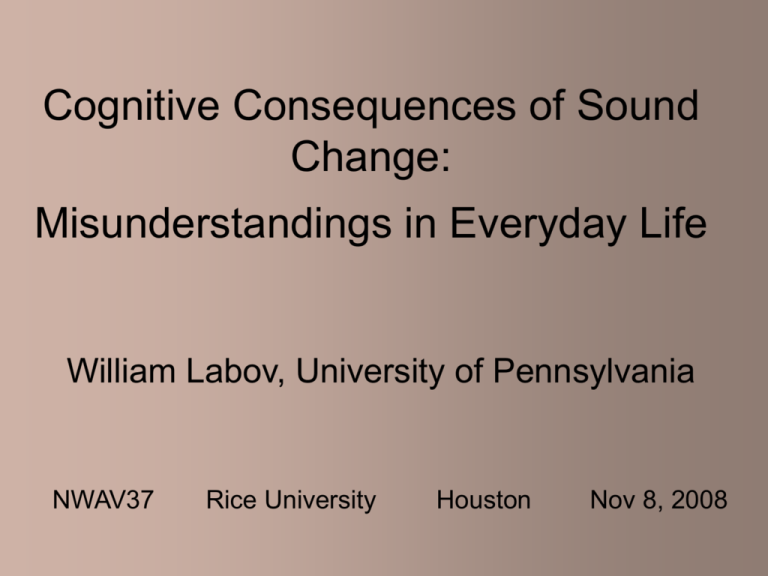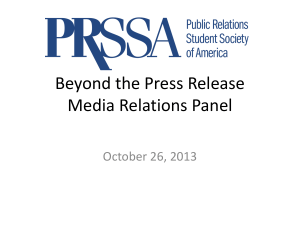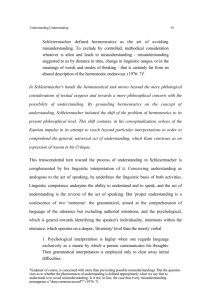Misunderstandings in Every-day Life
advertisement

Cognitive Consequences of Sound Change: Misunderstandings in Everyday Life William Labov, University of Pennsylvania NWAV37 Rice University Houston Nov 8, 2008 This PowerPoint can be downloaded from www.ling.upenn.edu/~labov Principles of Linguistic Change Vol III: Cognitive and cultural factors Ch. 1. Introduction Part A. Cross dialectal comprehension Ch. 2. Natural misunderstandings Ch, 3. Replication of the Peterson-Barney Experiment Ch. 4. The Gating Experiments Part B. The life history of linguistic change Ch. 5. Triggering events Ch. 6. Governing principles Ch. 7. Forks in the road Ch, 8. Divergence Ch. 9. Driving forces Ch. 10. Yankee cultural imperialism and the Northern Cities Shift Ch. 11. Experimental evidence on evaluation of the NCS Ch. 12. Endpoints Part C. The unit of linguistic change Ch. 13. The binding force in linguistic change. Ch. 14. Words floating on the surface of sound change Part D. Transmission and diffusion Ch. 15. The diffusion of language from place to place Ch. 16. The diffusion of language from group to group¯ Over-all success in identifying Chicago /k_d/ utterances keyed kid cade Ked cad kide cowed cod cawed coid code cud cooed cud Percent correct in Gating Experiments by city and educational level in Cross Dialectal Comprehension study: block block living on Senior citizens one block living on one block Standard form for collecting misunderstandings MISUNDERSTANDINGS Date__________________ Speaker______________________ Hearer ________________ Dialect area ___________________ ______________________ Speaker said [continue on back for full setting]: Hearer head: Hearer corrected misheafing after ____sec ____ min ____before utterance was over ____ by speaker’s response to look or query ____ by inference from further utterances ____ by accidental events that followed Natural misunderstanding token vp/np Main contributors to the study of natural misunderstanding Home dialect Robin Sabino Long Island City Gillian Sankoff Montreal Wm Labov [WL] NNJ Ruth Herold Connecticut Mark Karan NNJ Sherry Ash Chicago Tom Veatch California Charles Boberg Edmonton Corey Miller NYC Other Total Total 137 137 123 88 67 63 31 12 6 204 868 dialect motivated 43 26 27 30 14 22 2 10 3 58 235 % dialect motivated 31 19 22 34 21 35 6 83 50 28 Numbers of natural misunderstandings observed, 1984-2008 350 300 250 200 150 100 50 0 84 Dialect motivated 85 86 87 27% 88 89 90 91 92 93 94 95 96 97 98 99 00- 25% Factors promoting and inhibiting misunderstanding 100 90 80 Percent 70 60 Inhibiting Neutral Promoting 50 40 30 20 10 0 Lexicon Dialect Phonology Pragmatics Syntax Percent distribution of locus of misunderstanding for dialectmotivated errors and others 70.0 60.0 40.0 Dialect-motivated 30.0 Other 20.0 10.0 s an a w Re e ho l se gm One seg- Two segW o ly si or d s en t en t se lost Tw nym Segment O ne Homo- gm lo en t Se gm om on ym st s 0.0 H Percent 50.0 ment ments Focus of misunderstanding >2 segments Reanalysis Syntactic reanalysis of homonymous sequences Philadelphia newscaster: leaving a third passenger too dazed to escape. Ruth Herold [CT]: . . . leaving a third passenger two days to escape. Tom Veatch [CAL]: [writing down items to buy] Two c’s in broccoli? Ruth Herold[CT]: What’s two-season broccoli? Judy S. [Phila]: We'll go down to Knights St. Mark Karan [NNJ] => We'll go down tonight's street. Re-analysis with single segmental misunderstanding Susan Mann [CA]: Can I pour us both juice? Ruth Herold [CT]: What's a spoke juice? Susan: [pɔ˔rəsb̥oθdʒu<s] Ruth => [pɔ˔rəsb̥okdʒu<s] Misunderstanding of a single segment Albert B [MI]: That batch of paper was terrible Rob B.[TE] => tearable How the misunderstandings were detected During the utterance 107 By an immediate query 370 By inference after 199 From observation of later events 72 Never 15 Correction of misunderstanding by immediate query Pat D. [Philadelphia]: I hated dissecting (frogs and worms) in science so the second time my class dissected I dissected an apple instead, and the time after that I dissected a carrot. Lois K. [=> I dissected a parrot]: You dissected a what? A delayed correction Charlotte M. [VA]: Every time Robin takes a picture of me she gets a "telephone pole" in the picture. Maureen S. [PI] => telephone call Charlotte: Yes, she gets a telephone pole in the pictures, even in the living room. Maureen: Well, maybe she has call forwarding, you know. Charlotte: Call forwarding? Maureen: Yes, you know that service. Charlotte: No, no, telephone pole. Maureen: Pole? What pole? A misunderstanding never corrected Rosemarie D. [carrying in dinner]: OK! Come to the table! WL [to Rosemarie D.]: You run a tight ship. Tom D.: She makes us slave. Rosemarie D.: Why would I want you to leave? Tom D.: One day, we'll explain it all to Rosemarie. Tom: [ʃime˔ɪksəsle˔ɪv] Rosemarie =>[ʃime˔ɪksəsli˕ɪv] Front upgliding vowels of Rosanne V., 30 [1996], Phila, TS 567 say An unusual pragmatic motivation of misunderstanding Resident, examining Gillian: Are you tenured? Gillian S. [CA]: Yes [ => tender] Resident: For how long? Gillian: What? Resident: How long have you had it? Gillian : What do you mean? Resident: How long have you had tenure? Gillian: [laughs, and nurse too, who understood 'tender'] Another rare pragmatic motivation Answering machine: "You've reached Sam and Ann's. Please leave a message after the tone and we'll call you back. Atissa Banuazizi => Ann will call you back. Sound changes Raising of /æ/ to [i:ə] Male in Computer Resource Center: It's located in Ann Arbor. Robin Sabino: => Ian. [She made him repeat it. He said it the same. She asked him to spell it, and he spelled ARBOR.] Robin Sabino: Ian Hancock is at Texas Corky Feagin => Ann Hancock Charlotte A. [VA]: Is Ann coming? Marybeth L. [Phila suburbs]: Incoming? Incoming from where? Raising of /i/ to [i:ə] Corky Feagin reports from John Baugh that a woman from outside of Texas told a Texan that her son was named "Ian". The Texan couldn't understand why anybody would name a child something so strange as the preposition IN. The Northern Cities Shift desk busses bosses mat head block socks Cross-dialectal effect of /o/ fronting in the Northern Cities Shift Neither my boyfriend Dave nor I are natives to Michigan, and we are not NCS speakers. Dave had the following misunderstanding happen three times in the Lansing area, at two different grocery stores, with two different workers: he asked for 'catfish' and the man behind the counter gave him cod, thinking he said 'codfish.’ --Jane Goodheart The Northern Cities Shift desk busses bosses mat head block socks Cross-dialectal effect of /e/ lowering in the Northern Cities Shift Telephone surveyor [Chicago]: Do you have any pets in the house? Brian T. [Eastern US] => pots. [thought that 'pot' was not likely since everyone has pots and pot = marijuana was too personal; asked for repetition several times until understood.] The fronting of (aw) in Philadelphia from [æʊ] to [e:ɔ] 2050 2000 1950 1900 1850 1800 1750 1700 1650 1600 1550 Low er w orking class Middle w orking class Upper w orking class Low er middle class Upper middle class Upper class The homonymy of “crown” and “crayon” in Philadelphia Crown [kre:ɔn] Crayon [kre:ɔn] Cross-dialectal perception of Philadelphia of /aw/ as [e:ɔ] Brian K. [Phila suburbs]: You know what else is there [in Easton, PA]? The Crayola Crayon factory. Sherry Ash [Chicago] => The Crayola crown factory. Christine K. [So. TN]: Laurel leaves were used to make crowns Robin Sabino [NYC] => to make crayons Intervocalic /l/ in Philadelphia as [ɤ]: Gating experiment: “I fell down the CELLAR steps” 90 80 Percent correct 70 Bir Col Bir HS Chi Col Chi HS Phi Col Phi Col 60 50 40 30 20 10 0 Word Phrase Sentence Cross-dialectal perception of Philadelphia intervocalic /l/ Bank teller [Phila, reads “William”] WL [ NNJ] => WHAM. Harvey S [Phila]: “Tell him it’s Harvey” MBH [NE] => Thomas Harvey. Tess [Phila]: Can Alice go on the volleyball courts? Gillian Sankoff, WL => Bible courts. Man [Phila]: Have you got a cooler? Mark Karan [NNJ]: Have you got a Coor? Homonymy of balance and bounce in Philadelphia: Jeffrey W. [Phila]: . . . to see if the payroll sheets balance Corey Miller [NY] => to see if the payroll sheets bounce. Larry B. [Phila, speaking to his 4-year-old son Jonathan] ". . . balance." Jonathan, 4: bounce. [repeat, and began to bounce up and down.] --observed by Ruth Herold A Philadelphian’s hyperperception of intervocalic /l/ Instructor [Phila]: Tell me what this sentence implies to you: "Mr. Williams strode into the office.” Student [Phila]: It means he was real casual. Instructor: For strode? as in stride? Do you know what "stride" means? Student: I'm sorry, I thought you said, "strolled". "Strode" means 'forcefully.' Mergers The merger of /i/ and /e/ before nasal consonants, Atlas of North American English Map 9.5 South The pin/pen merger Bank teller [African-American]: You have your Penn ID? Sherry Ash [Chicago]: PIN ID? Teller: Your Penn ID? Sherry: PIN ID? Melissa H. [TN]: Every time I say “Insurance”. . . Ruth Herold [CT] => every time I say “entrance” The low back merger of /o/ and /oh/ (ANAE Map 9.1) Canada E.N.E. The West W. Pa. Montreal allophones of merged /o ~ oh/ copy [kɔpi] coffee [kɔfi] caught [kɒt] The low back merger: perception of copy as coffee Gillian S. [Montreal]: We won't save any time to come here for a copy shop. WL [NNJ]: Coffee shop? Gillian S., [Montreal]: Oh! Copy shop! Here it is! WL [NNJ] =>looks for coffee shop Gillian S. [Montreal]: I wonder if there's a copy place near the airport? WL [NNJ] => Why would she need coffee? David S. [Montreal]: It's time to make the copies. WL [NNJ]: But I've already had my coffee David Sankoff [Montreal]: I'll get your copy right away. WL [NNJ] => Why is he getting us coffee? Ann T. [Vancouver]: Do you have the copy key? Don Ringe [KY]: Is there a key to the coffee? The low back merger: perception of coffee as copy Carl R. [Boston]: How did the coffee machine work out? Sherry Ash [Chicago]: [began a story about her copying machine] David B. [OK]: There is a nice coffee stain on this one. Mark Karan [NNJ] => There is a nice copy stain on this one The low back merger: confusion between Don [Ringe] and Dawn [Suvino] Gillian S. [Montreal]: It would be even better if Don could take her to the airport. WL [NNJ] => wondered for some time about how Dawn, who is blind, could take her. Ann T. [CA]: [at students meeting] Elise spent quite a long time talking to Dawn. Ruth Herold [CT]: What do you mean? [=> since Don is not a new student] Sherry Ash [Chicago]: I’ve been talking to Dawn here. . Carl R. [Boston]: . . Hindle? [=> Don Hindle] Mary A. [RI]: I started sneezing . . . and after a while I figured Dawn’s dog must’ve been in there. Ann T. [CA]: Don doesn’t have a dog. Mary: No, DAWN! Misunderstanding of mergers by status of speaker and hearer Speaker Hearer Cases Merged Unmerged Unmerged Merged 5 Merged Merged 0 Unmerged Unmerged 0 20 Distribution of misunderstandings within and across sub-systems Within subsystems Across sub-systems 19.19% 22.9% 27% 5.4% 15.15% 59.60% 2.7% 0% 6.06% 42% /_N /_l /_r /KL_ other Confusion across subsystems in natural misunderstandings Loss of glide in perception unmkd _N iy↔i uw↔u _L unmkd _N 1 2 ey↔e ow↔ʌ 5 ay↔a aw↔a 5 3 1 3 4 13 4 17 Total KKL_ Addition of glide in perception 3 2 10 KKL_ 1 1 1 1 _L 1 2 1 2 2 2 4 4 4 9 2 Misunderstanding maintained over several turns Dana M. [NYC]: What are you giving up for Lent? Caroline H. [UK] => What are you giving out for Lent? Caroline [annoyed] : "Pancakes." Dana: You're giving up PANCAKES? Confusion of short vowels in natural misunderstandings unmarked/_nasal/__liquid/liquid cluster__ /i/ 0-2-0-1 1-0-0-0 /u/ 8-0-1-0 1-0-0-0 /e/ /ʌ/ 9-2-3-0 4-2-1-0 /æ/ 5-0-0-3 /o/ 1-1-0-0 Back Chain Shift before /r/ in Philadelphia: Rosanne V., 30, TS 567 The Back Chain Shift before /r/ in Philadelphia: card => court Steve N. [Phila]: We better get hold of him soon, because his [de:ns kɔrd] is going to be filled up. Gillian Sankoff [Canada] => dance court [couldn't figure out what he meant; but after she hung up, realized that he had meant dance card].






